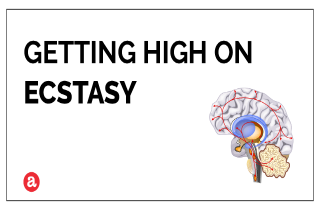Yes, you can get high on ecstasy. But does ecstasy work for everyone? And what are the risks of developing tolerance to ecstasy, or becoming addicted to it? We review here. Then, we invite your questions about getting high on ecstasy at the end.
Psychoactive ingredients of ecstasy
Ecstasy, popularly known as MDMA (3, 4-methylenedioxy-methamphetamine), is a synthetic, psychoactive drug that has similarities to both the stimulant amphetamine and the hallucinogen mescaline. The popular term Molly (slang for “molecular”) refers to the pure crystalline powder form of MDMA, usually sold in capsules. MDMA is the methylenedioxy derivative of methamphetamine. Starting materials in its illicit manufacture include isosafrole and safrole.
Ecstasy chemistry and use
Ecstasy can produce feelings of increased energy, euphoria, emotional warmth and empathy toward others, and distortions in sensory and time perception. MDMA is taken orally, usually as a capsule or tablet. The drug’s effects last approximately 3 to 6 hours, although it is not uncommon for users to take a second dose of the drug as the effects of the first dose begin to fade.
Ecstasy, euphoria, and euphoric effect
MDMA acts by increasing the activity of three neurotransmitters in the central nervous system: serotonin, dopamine, and norepinephrine. The emotional and pro-social effects of MDMA are likely caused directly or indirectly by the release of large amounts of serotonin, which influences mood (as well as other functions such as appetite and sleep). Serotonin also triggers the release of the hormones oxytocin and vasopressin, which play important roles in love, trust, sexual arousal, and other social experiences. However, the surge of serotonin caused by taking MDMA depletes the brain of this important chemical, causing negative after effects – including confusion, depression, sleep problems, drug craving, and anxiety — that may occur soon after taking the drug or during the days or even weeks thereafter.
Ecstasy and central nervous system effects
How long do ecstasy effects last? The desired effects of ecstasy may last only an hour or more, depending on dose. Low to moderate doses of ecstasy (50-200 mg) can produce:
- a sense of intense well-being (euphoria)
- an excited calm or peace
- ataxia
- blurred or double vision
- changes in perception
- dry mouth
- empathy
- feelings of well-being
- heightened sensitivity, increased
- increase in physical and emotional energy
- increased light sensitivity
- increased sociability and closeness
- mild intoxication
- muscle tension
- relaxation
- responsiveness to touch
- sweating
At higher doses, ecstasy provokes:
- agitation
- illusory or hallucinatory experiences
- panic attacks
In high doses, MDMA can interfere with the body’s ability to regulate temperature. On rare but unpredictable occasions, this can lead to a sharp increase in body temperature (hyperthermia), which can result in liver, kidney, or cardiovascular system failure or even death.
Mixing ecstasy with other substances
Ecstasy is commonly taken in combination with other drugs. However, there are risk associated with perception when you mix ecstasy with alcohol, depressants, or other stimulants. LSD is sometimes used in combination with MDMA to increase its duration of effects. Residual and unwanted effects are generally gone within 24 hours although confusion, depression and anxiety may last several weeks.
Am I addicted to ecstasy?
There are some common signs of ecstasy or drug addiction. If users can’t tolerate not having the drug or experience obsessive thinking about ecstasy, they may be addicted to ecstasy. Abusers of ecstasy will also regularly fail in their financial obligations because of their drug use. They will not be able to function without ingesting the drug. The thought of not having the drug will cause them extreme anxiety, as it is the most important thing in the abuser’s life. An abuser will often make excuses for his or her behavior and try to justify the drug use.
Getting high on ecstasy questions
While the risk of ecstasy addiction is rather low, regular ecstasy abuse can lead to psychological dependence on MDMA. So, if you’re thinking about using ecstasy to get high, you need to consider all the risks.
Still have questions about getting high on ecstasy? Please leave your questions in the comments section below. We’ll do our best to respond to you personally and promptly.









Related Posts